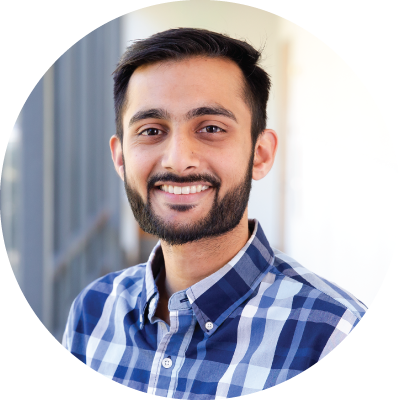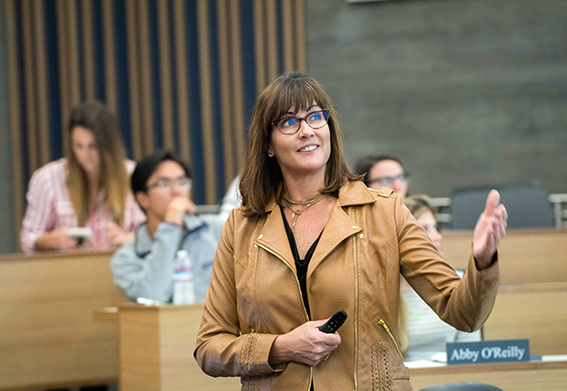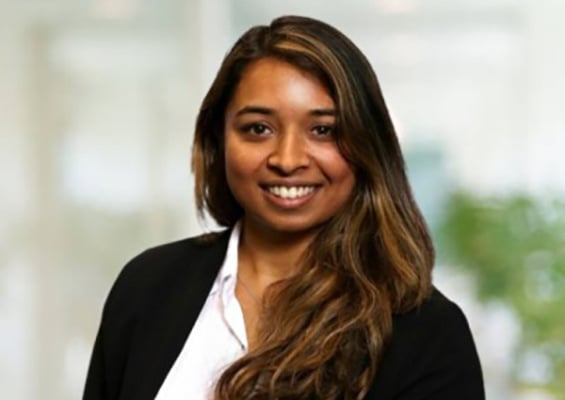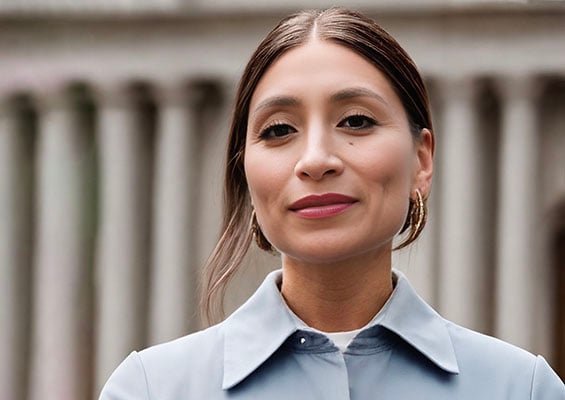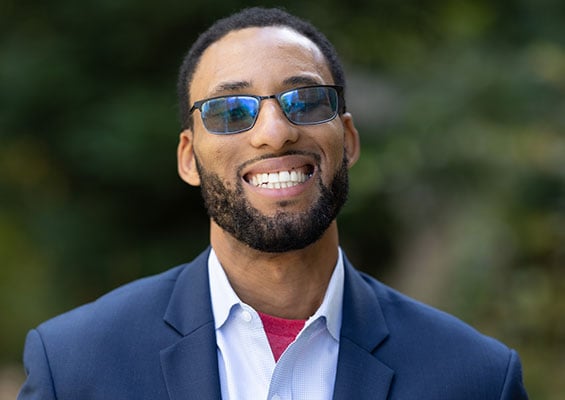Starting from the position that “if you aren’t intentionally inclusive, you are unintentionally exclusive,” Kellie McElhaney helped develop the concept of equity fluent leadership. In the classroom and as the founding director of the Center for Equity & Gender in Leadership (EGAL), she promotes the use of equity fluency in business to develop value-creating strategies.
How did the concept of equity fluency get started?
It started with five MBA students talking in my living room. They went on to become EGAL's student advisory board.
Our core competency at Haas is educating leaders. We decided we wanted to elevate this concept of equity fluency into the Berkeley Haas leadership model. Every leader, at every level of an organization, has to be equity fluent. Equity fluent leaders understand the value of different lived experiences and courageously use their power to address barriers, increase access, and drive change for positive impact.
EGAL’s core content is a series of evidence-based playbooks prescribing equity fluent leadership strategies across myriad business functions and areas. We want them to be used in the business world, not to only exist in an academic journal, which can take a long time in getting there. We run design-thinking sessions with our partners and other companies to make sure we are creating something useful and stress-test the strategies to see how they will work in real-life situations. The first playbook is about dual-career couples; another, addressing artificial intelligence and bias, is nearly done. Now, we are proudly working on one around an equitable recovery from COVID-19.
How do you teach equity fluency in the classroom?
I strive to create a “brave space” in my classroom by fostering a high degree of psychological safety among my students, such that they can be brave. This isn’t the same as creating a “safe space”—a term that frustrates me. Being in a brave space allows you to ask difficult questions or disagree in a way that, at first blush, might feel politically incorrect.
I give students lots of opportunities to look inward and reflect, to understand their lived experiences, their own sense of power, privilege, biases, and blind spots. For example, I have students analyze what I call their “personal board,” meaning their closest group of non-family members. We then look at how closely students’ personal boards tend to resemble them.
At the end of the course, students create their own personal equity fluent leadership strategy. These are often beautiful. One woman did the assignment with her husband in the form of letters to their future children, describing what they want their kids to know about their lived experiences, their biases, and their responsibility and power to create change. One student wrote a spoken word poem, another wrote a diversity and inclusion curriculum for a middle school class where she volunteered.
When we were able to meet in a classroom, there were lots of small group and pair-and-share activities. That is where the real learning comes from, their peers. I’ve been pleased at how well this has translated into online learning using Zoom breakout rooms, for example.
I feel that we have pressure valves of vulnerability, especially in the business world, that need to be released."
What are the rewards of teaching Haas MBAs?
When prospective students visit my classes, I choose three students to tell the visitors why they should enroll at Haas. I keep hoping someone will say “because of the brilliant professors,” but they always talk about the close-knit, collaborative nature of the student body and student-led culture here. I see that strong sense of community the students have created; how they hold space and support for each other.
I also love to see them stretch their comfort zone to express views that might not seem popular and push through those discussions.
It’s rewarding to see students in the executive and evening/weekend MBA programs so quickly attach our classroom discussions to their real work. They bring back stories about using a classroom exercise on the job and advance everyone’s knowledge.
What is the most under-appreciated skill that leaders should be paying attention to?
Recently I co-facilitated an MBA experience called Dialogues Over Dinner. The last question we discussed was what leaders could do to promote society’s equitable recovery from COVID-19. Everyone noted the importance of not assuming that we all are having the same COVID-19 experience. Instead, leaders have to ask their employees about their experiences, and members from the community in which they live and operate, to understand their lived experiences, many of which are quite tragic.
The COVID-19 pandemic has magnified the lack of equity in the US. That’s why EGAL is rapid prototyping a new playbook on recovery strategies using equity fluent leadership.
What new course would you design for the MBA curriculum?
A course on the courage to be vulnerable. I would call it “Courageously Vulnerable Leadership.” I feel that we have pressure valves of vulnerability, especially in the business world, that need to be released. We include “courageous” in our definition of equity fluency on purpose. We’ve come through a period when leaders have not acted with courage.
We in the business world tend to fixate on the word “powerful” to describe leaders. For years, I’ve asked my students which leaders they most admire, and I’ve kept track of the qualities that characterize those leaders. The top five are a high degree of self-awareness, empathy, authenticity, inspiration, and vulnerability. Those qualities are where real power resides.
The expertise and insight your professors bring helps deepen and enhance your MBA journey. By selecting a top school with top-notch professors, you maximize your experience.
Read more from the Take 5 with a professor series:
- Bill Pearce says most important trait of a successful marketer is empathy
- Maura O'Neill says narrow-mindedness is the enemy of innovation
- Dave Rochlin talks flipping the classroom: MBAs learn by doing
- Clark Kellogg shares how he teaches design thinking, creativity, and innovation
- Jennifer Cohen talks equitable and inclusive leadership
- Jenny Chatman gives three benchmarks of an effective organizational culture
- Lucas Davis shares hardest economic concept for MBA students to grasp
